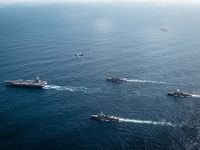Every year tens of thousands of people try to change their lives by immigrating illegally to other countries. Some succeed and change their lives - many don't, and lose them while trying to cross the ocean in small craft or hiding in trucks.
Some are caught after, or even before, crossing any borders. It is mostly people from Third World countries such as Pakistan, Afghanistan, Sri Lanka, Iraq, Iran, Asia, and Africa that attempt to reach Europe or the United States.
They take the risks to escape difficult conditions in their own countries, earn more money and live a better. Most end up disappointed. According to statistics, 3,935 people attempted to get into Europe via Turkey in the last three years. About 80 percent of those illegal immigrants journeyed from the Aegean coast because of its proximity to several Greek islands - the first step from Turkey to continental Europe.
According to a report by Professor Ercan Tatlidil, lecturer in the sociology department of the arts and literature faculty at Ege University, 716 people attempted to emigrate to European countries via Turkey or tried to settle in Turkey itself.
Some 263 Turks, 130 Pakistanis, 30 Iraqis, 84 Palestinians, 102 Afghans, 10 Nigerians, 73 Moroccans, 5 Greeks, 14 Sri Lanka and 5 Kenyans were caught in Turkey while trying to reach Europe. Turkish immigrants usually choose to emigrate to European countries such as Germany, England, Italy and Scandinavian countries.
Italy is currently a popular destination due to the Italian government's lenient attitude towards the leader of outlawed Kurdistan Workers' Party (PKK), Abdullah Ocalan.
According to Tatlidil's report, following the collapse of the Soviet Union, people from Ukraine, Moldova and Belarus have been trying to immigrate to the United States.
Latin American nationals also favor the United States as a place to reach in order to escape from their existing circumstances. Africans, primarily Nigerians, try to reach Turkey, Italy and France. According to them living conditions are better in these more developed nations.
Nigerians favor life in the large cities of Istanbul, Rome and Paris. In Turkey, people migrate almost daily from east to west because they are poor and hope to find a better life. Having made the move, most are disappointed because of the West's tough living conditions.
The increasing rate of immigration brings with it drug problems and crime. Due to inadequate standards of education and poor living conditions, illegal migrants can't find work in the public or private sectors.
Professor Tatlidil explains that immigration occurs for "economic reasons and so people can achieve a higher standard of living." He said "developed countries are the 'gateways of hope' for the poor citizens of third world countries."
Between 1957 and 1974 European countries admitted these immigrants and 'cheap labor' was born. After 1974, however, European countries departed from their 'cheap labor policy,' and closed their doors to immigrants. This situation brought about a new phenomenon, that of 'fugitive labor'."
According to the report, intensive immigration can be observed in Germany and the Scandinavian countries. "The basis of the 'fugitive labor' trend comes from people's dreams of wanting to enjoy 'the good life.' We see that none of the poorest families migrate. Those who are one level higher than the poorest families take the risk because they can support themselves financially in the destination country during the adaptation period," he said.
Meanwhile, after Europe's doors closed to immigrants, 'human traders' appeared. These dealers take huge sums of money from families who wish to emigrate to the West. "I would like to state that when talking about illegal migration, children are the greatest concern because on these journeys they travel in vessels or the lorries and get hurt while doing so. The problem we now face is that 'human trade' has become a big industry, the solution to which lies in the hands of the United Nations," Professor Tatlidil stressed.
According to reports most migrants who attempted to get to Europe via Turkey did so by sea, often exposed and defenseless in flimsy boats, often with fatal results.
"
These are the results of political problems; and behind the reality of political migration lies economic uncertainty," Tatlidil added.
He said all nongovernmental organizations (NGOs) should come together and work out solutions to put a stop to the growing industry of trading in humans - "modern slavery." –(Albawaba-MEBG)
© 2000 Mena Report (www.menareport.com)







